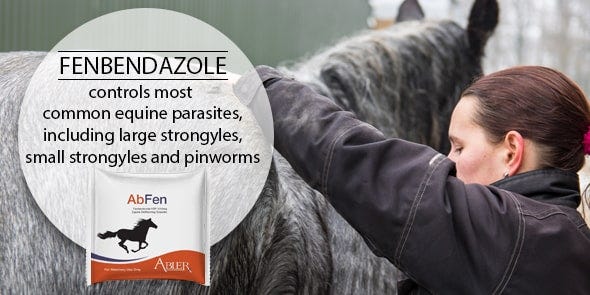We use cookies to make your experience better. To comply with the new e-Privacy directive, we need to ask for your consent to set the cookies. Learn more
AbFen: The Great Migration of Equine Parasites
Over the years, there have been different recommendations on equine deworming programs coming from veterinarians, drug companies, and even drug retail stores. Some would suggest daily worming. While others would recommend rotational equine deworming program. The equine industry understands the importance of keeping the horse’s GI tract clear of parasites, but it becomes high priority during certain seasons, particularly in fall ,autumn and spring.
Strongyles lifecycle:
Among the most harmful and notorious parasites are called strongyles, both small and large species. They are more commonly referred to as bloodworms or red worms. Heavy strongyle infestation causes anemia, unthriftiness, colic, weight loss, and poor hair coat, and the like. Large strongyles can do great damage to the GI tract. However, in recent years, veterinary science have discovered that small strongyles can be just as destructive. At present, there are more than 40 species of small strongyles recorded.
During certain stages of strongyle larvae, they reside and travel through the small intestinal lining. They are microscopic and pretty harmless during that stage. The seasons, particularly early spring and late autumn, can have an influence on the life cycle of strongyles. In mid to late fall, before the first frost, small strongyle larvae may feel that cold months are fast approaching. In cold months, their chance of survival is greatly inhibited when they are outside of their equine host. They may ‘realize’ that it’s time to get out and begin another lifecycle before winter comes and kill them off.
At that point, the larvae of migrating small strongyle break out from the intestinal tract with nothing to stop them. They crawl within the gut of your horse, causing the mucosal wall to have minor bleeding and painful irritation, subsequently, wreaking havoc. Keep in mind that we are not simply talking about a couple strongyle larvae, but thousands, and they break out all at once. Although colicky episodes can be caused by different factors, strongyle larvae migration is one major cause. This happens especially during fall, when small strongyle larvae (now encysted) break out to continue the lifecycle.
How to protect?
So what can you do to protect your horse from these migrating parasites? The most effective treatment you can give is fenbendazole for horses, AbFen™. A double dose of this compound, which is to be given for 5 consecutive days, can target encysted strongyle larvae before they can have the chance to migrate and begin another lifecycle. Purge deworming with AbFen™ should be done at least once in a year, most preferably in early spring or early fall. Better results can even be achieved if done twice each year.
AbFen™ is a granulated form of fenbendazole. Check with the local veterinarian regarding the perfect time to administer this to your horse, with consideration on your environmental and climatic conditions. Protect your horse from life-threatening equine parasites health problems. Help stop migrating strongyles with AbFen™.









Validate your login